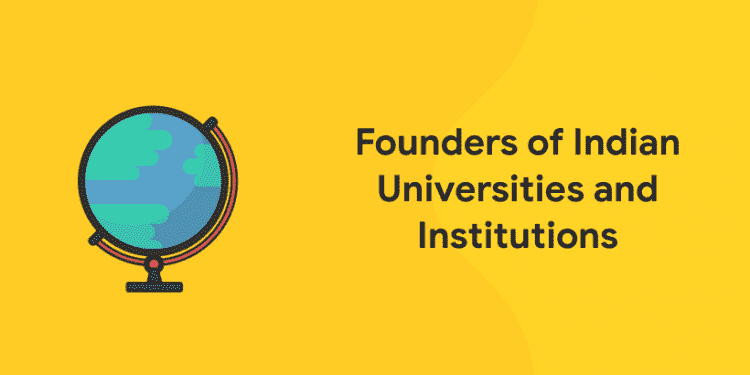Table of Contents
Education is a process of learning where the accumulated knowledge is transferred to the next generation. Along with knowledge, moral values, culture, and behavioral molding also happen. The Indian education system has always paved the light for modern educational institutions all over the world. The ancient Vedic schools like Takshashila, Nalanda had a resemblance to modern universities. Now, the higher education system in India is monitored by the University Grants Commission. Read about the Indian Universities and the names of the founders of Indian Universities.
List of Founders of Indian Universities
| Year | University Name | Name of Founder | Location |
| 1818 | Serampore College | William Carey, Joshua Marshman, and William Ward | West Bengal |
| 1847/1949 | Indian Institute of Technology (Thomason College of Civil Engineering) | University of Mumbai | Roorkee |
| 1857 | University of Mumbai
University of Madras University of Calcutta |
Sir Charles Wood’s | Mumbai
Chennai Kolkatta |
| 1875 | Aligarh Muslim University | Syed Ahmad Khan | Uttar Pradesh |
| 1875 | Allahabad University
(Oxford of East) |
Sir William Muir | Uttar Pradesh |
| 1880 | Deccan Education Society | Vishnushastri Chiplunkar, Lokmanya Bal Gangadhar Tilak | Pune |
| 1881 | St Stephen’s College | Rev. Samuel Scott Allnet | Delhi |
| 1882 | Panjab University, Chandigarh | Chandigarh | |
| 1885 | Fergusson College | Bal Gangadhar Tilak | Pune |
| 1887 | Nizam College | Syed Hussain Bilgrami | Hyderabad |
| 1900 | Christian Medical College | Dr. Ida Sophia Scudder | Vellore |
| 1909 | Indian Institute of Science | Jamsetji Tata | Bengaluru |
| 1916 | Benaras Hindu University | Madan Mohan Malaviya | Varanasi |
| 1916 | University of Mysore | His Highness Shri Nalvadi Krishnaraja Wadiyar – IV | Mysore |
| 1917 | Patna University | JG Jennings | Patna |
| 1918 | Dakshin Hindi Prachar Sabha | Mahatma Gandhi | Chennai |
| 1918 | Osmania University | Mir Osman Ali Khan Akbar Hydari | Hyderabad |
| 1920 | Jamia Millia Islamia | Mohammad Ali Jouhar Hakim Ajmal Khan | Delhi |
| 1921 | Vishwa Bharti University | Rabindranath Tagore | Kolkata |
| 1921 | Kashi Vidyapeeth | Bhagwan Das, Shiv Prasad Gupta | Varanasi |
| 1921 | University of Lucknow | Raja Sir Mohammad Ali Mohammad Khan | Lucknow |
| 1925 | Loyola College | Francis Bertram | Chennai |
| 1927 | Dr. B.R. Ambedkar University (Agra University) | Prof. G. Ram Reddy. | Agra |
| 1929 | Annamalai University | Rajah Sir S. R. M. Annamalai Chettiar | Chidambaram |
| 1931 | Indian Statistical Institute | Prasanta Chandra Mahalanobis | Kolkata |
| 1936 | Kalakshetra | Rukmini Devi Arundale | Chennai |
| 1938 | Bhartiya Vidya Bhavan | K.M. Munshi | – |
| 1944 | Bhartiya Jnanpith | Sahu Shanti Prasad Jain Shanti Rama Jain | – |
| 1945 | Tata Institute of Fundamental Research | Homi J Bhabha and J.R.D. Tata | Mumbai |
| 1948 | Miranda House | Maurice Guiyer | New Delhi |
| 1949 | Delhi School of Economics | V.K.R Varadaraja Rao | Delhi |
Practice and learn with Entri for General Awareness Topics and Quizzes.
Ancient Universities and Founders
| Name of University | Year | Founder (Individual or Dynasty) | Present Location |
| Takshashila | 300 BCE | – | Pakistan |
| Telhara | 12 – 8th BCE | Kushana Period | Nalanda, Bihar |
| Sharada Peeth Temple University | 12 – 6 BCE | – | Kashmir |
| Nalanda | 5th century | Kumara Gupta I | Bihar |
| Vallabhai | End of BCE | Maitraka Dynasty | – |
| Odantapuri | 7th century | Gopala, Pala King | Bihar |
| Vikramashila | The later period of the 7th century | Dharmapala, Pala King | Bihar |
| Jagaddala | 11th century | Rampala, Pala King | Bangladesh |
| Pushpagiri | End of BCE | – | Odisha |
| Morena Gold Triangle | 8th century | – | Madhya Pradesh |
| Kanthalloor Sala
(Nalanda of South) |
9-12th century | – | Tamil Nadu |
| Nagarjuna Vidyapeeth | 7-8th centuries | – | Andhra Pradesh |
Download the PDF for Founders of Indian Universities
1: Who was the first woman President of India?
To download PDF for the names of Founders of Indian Universities, Click here.
Free UPSKILLING Courses!
Take your first step toward mastering in-demand skills, acing interviews, and securing top-tier jobs with Entri's free upskilling courses.
Start Learning!List of Indian Universities
Universities can be divided into four types – Central universities, State universities, Private universities, and Deemed universities. As of July 2021, India has 984 universities in total. Rajasthan is having the most number of universities (85).
| State | Number of Universities |
| Assam | 26 |
| Tamil Nadu | 54 |
| Kerala | 19 |
| J & K | 12 |
| Ladakh | 01 |
| Gujarat | 76 |
| Goa | 01 |
| Maharashtra | 65 |
| Chattisgarh | 29 |
| Chandigarh | 02 |
| Odisha | 30 |
| Himachal Pradesh | 25 |
| West Bengal | 44 |
| Uttarakhand | 34 |
| Tripura | 03 |
| Sikkim | 06 |
| Rajasthan | 85 |
| Andhra Pradesh | 36 |
| Arunachal Pradesh | 10 |
| Meghalaya | 10 |
| Manipur | 09 |
| Mizoram | 02 |
| Delhi | 24 |
| Nagaland | 05 |
| Madhya Pradesh | 66 |
| Uttar Pradesh | 75 |
| Jharkhand | 28 |
| Punjab | 30 |
| Puducherry | 02 |
| Telangana | 28 |
| Haryana | 51 |
| Karnataka | 66 |
| Bihar | 30 |
University Grants Commission – UGC
In its first form, UGC was formed in 1945 to supervise the works of the Central Universities such as Aligarh, Banaras, and Delhi. In 1947, the Committee was committed to the responsibility of dealing with all the existing Universities at that time.
After Independence, the University Education Commission was set up in 1948 under the Chairmanship of Dr. S Radhakrishnan. The then responsibility of the commission was to report on Indian university education and suggest improvements and extensions that might be desirable to suit the present and future needs and aspirations of the country.
In 1952, the Union Government decided to allocate grants-in-aid from public funds to the Central Universities and other Universities and Institutions of higher learning. And, it was termed the University Grants Commission. As a part of the decision, the University Grants Commission (UGC) was formally inaugurated on 28th December 1953 by late Shri Maulana Abul Kalam Azad, the then Minister of Education.
UGC has decentralized its operations by setting up six regional centers at Pune, Hyderabad, Kolkata, Bhopal, Guwahati, and Bangalore. The main head office of the UGC is positioned at Bahadur Shah Zafar Marg in New Delhi, with two other additional bureaus.
The total number of Universities, according to the statistics of UGC, 2021 is – 988
- State Universities – 429
- Deemed to be Universities – 125
- Central Universities – 54
- Private Universities – 380
Top Universities flourishing for 100+ years
- Senate of Serampore University (West Bengal)
- University of Calcutta (West Bengal)
- Panjab University (Chandigarh)
- University of Madras (Tamil Nadu)
- Aligarh Muslim University (Uttar Pradesh)
- University of Mumbai (Maharashtra)
- Allahabad University (Uttar Pradesh)
- Banaras Hindu University (Uttar Pradesh)
- University of Mysore (Karnataka)
- Patna University (Bihar)
Universities and Slogans
| Name of University | Slogans/ Motto |
| All India Institute of Medical Sciences AIIMS | Body alone is the instrument of doing all duties/deeds |
| Aligarh Muslim University | Taught man what he knew not |
| Amrita Vishwa Vidyapeetham | Reverent attains wisdom, Rigveda |
| Allahabad University | Every branch yields a tree |
| Bharatiya Vidya Bhavan | amrita tu vidya / (Knowledge is nectar) |
| Banaras Hindu University | Knowledge imparts immortality |
| Birla Institute of Technology | That is knowledge which liberates |
| Cochin University of Science and Technology | May our knowledge become brilliant |
| Central Board of Secondary Education | Asato mA sadgamaya ((Lead us) From Untruth to Truth |
| Devi Ahilya Vishwavidyalaya | May (the divine savitA) propel our intellect |
| Guru Jambheshwar University of Science and Technology | Realized knowledge |
| Himachal Pradesh University | shastre shaastre cha kaushalam |
| Hidayatullah National Law University | for the sake of establishing the primacy of the laws of eternal value |
| Indian Institute of Technology Madras | Effort Yields Success |
| Indian Institute of Technology Kharagpur | Excellence in work is (true) yoga |
| Indian Institute of Technology Bombay | Knowledge is the Supreme Goal |
| Indian Institute of Technology Roorkee | without effort nothing is possible |
| Indian Institute of Management Kozhikode | excellence in action is yoga |
| Indian Statistical Institute | even in differences, see the unity |
| Jawaharlal Nehru Technological University, Hyderabad | Excellence in action is yoga |
| Kurukshetra University | do while steadfast in yoga |
| Mahatma Gandhi Kashi Vidyapeeth | Knowledge Imparts Immortality |
| Manipal University | Knowledge is the attainment of God |
| National Institute of Technology, Raipur | Let the rise of goodness happen every day |
| Netaji Subhas Institute of Technology | Let good (thoughts) come from everywhere, from all the world |
| Osmania University | Lead us from Darkness to Light |
| Panjab University | Lead us unto the light from darkness |
| Patna University | Satya Tatveya Vijeyagyatsmeva |
| Ranchi University | May our knowledge become brilliant |
| Symbiosis International University, Pune | Vasudhaiva Kutumbakam (The world is one family) |
| Senate of Serampore | Wise will possess the glory |
| Sanskrit Collegiate School | tamaso mA jyotirgamaya (From the darkness to light) |
| Tezpur University | Specialized Knowledge Promotes Creativity |
| University of Delhi | Nishtā Drithih Satyam |
| University of Hyderabad | Education results in liberation |
| University of Calicut | Nirmaya Karmana Sree |
| University of Madras | Learning promotes natural talent |
| University of Mysore | Nothing is equal to knowledge |
| University of Mumbai | The fruit of learning is a good character and righteous conduct |
| University of Kerala | Karmani Vyajyate Prajna |
| University of Calcutta | Advancement of learning |
| University of Rajasthan | Dharmo Vishwasya Jagatah Pratishtha |
| University of Hyderabad | Education results in liberation |
| Visva Bharati University | Where the world makes a home in a single nest |
| West Bengal National University of Juridical Sciences | Judgement Devoid of Logic Destroys Dharma |
So, hope the article was beneficial for the readers to have a better understanding of Indian universities and the names of their founders. As discussed the educational history of India has started from a very early period – Gurukula to the latest innovative technologies. Let us conclude with the quotes of Mahatma Gandhi and Nelson Mandela regarding Education:
‘What is really needed to make democracy function is not knowledge of facts, but right education.’ – Mahatma Gandhi
Education is the most powerful weapon which you can use to change the world’ – Nelson Mandela.














